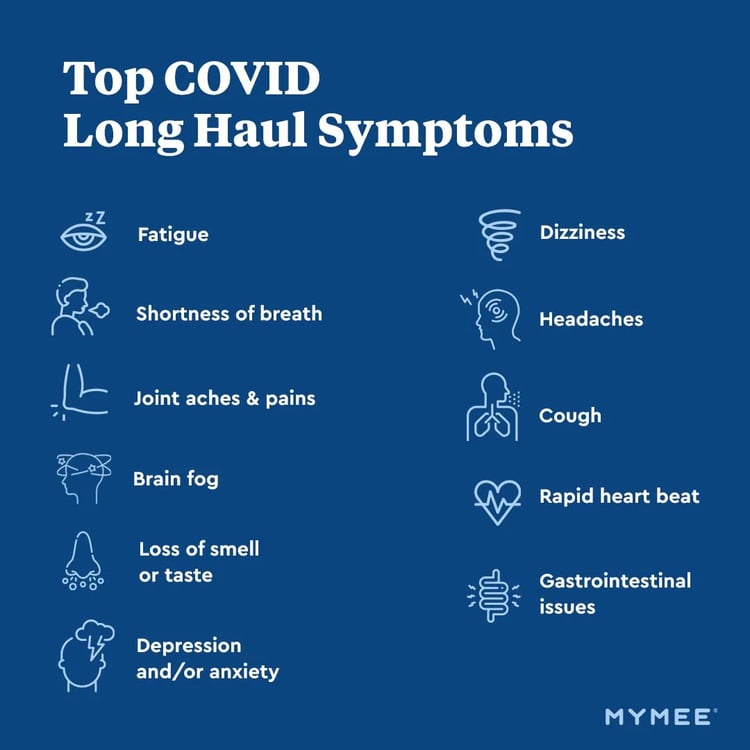As more studies and research become available regarding COVID-19 and the effects that the virus has on those infected, we are continuing to learn more about the long term impact and gain a better understanding of the growing COVID long haulers symptoms list.
While many people who contract COVID are able to fully recover from COVID-19, it is estimated that in the United States, 25-50% of people develop post COVID, also known as COVID long haul. These COVID-19 Long Haulers can continue to experience symptoms for more than 4 weeks after initial infection.
These COVID Long Haul symptoms can range in severity; from mild but chronic, to severe and debilitating. It is not uncommon for COVID-19 patients with long term symptoms lasting for weeks or months to be forced to change their daily lives to be able to accommodate their reduced ability to perform their normal activities.
We have seen trends in the symptoms and experiences of those with long COVID, but we have also seen differences. With a list of more than 200 COVID Long Haul symptoms reportedly associated with this new chronic condition, which of these symptoms persist can certainly be individual and depend on the person, but there are also many commonalities.

11 Common COVID Long Haulers Symptoms List
- Fatigue Those who have long haul COVID-19 often experience extreme fatigue. This symptoms is often debilitating and not relieved with rest or sleep.
- Shortness of breath COVID long haulers experience shortness of breath which seems to be worse with activity or mild exertion. This symptoms can also occur seemingly out of nowhere with very little activity.
- Joint aches and pains Pain is a common symptom of long COVID. These pains can be persistent and be concentrated in a few specific joints or feel like an all body pain, similar to the body aches that often occur with the flu.
- Brain fog Oftentimes, COVID long haulers have trouble concentrating, remembering words or tasks or a shorter attention span than usual. The severity in brain fog differs, as some people report being unable to think of a specific word or name and others have trouble forming sentences or remembering simple tasks such as turning the oven off. Brain fog is a common symptom often reported in those that have had to take a leave of absence from work.
- Loss of smell or taste In some, smell and taste are completely gone, while others experience a decrease or inconsistency that can last for months. An especially frustrating symptom, this can also have larger health implications, such as accidentally eating spoiled food or being unable to smell food that is burning.
- Depression and/or anxiety Fear, sadness and anxiety are common symptoms for COVID long haul patients. With unclear and vast symptoms, recovery, and social situations often are also a part of a mentally-distressing post-COVID syndrome. Lack of information or misinformation about potential cures, what to expect, and why symptoms persist is what most often causes these mental health symptoms. The need to isolate and stay away from loved ones also causes depression and anxiety symptoms, as well as having to change one’s lifestyle or leave a job.
- Dizziness Dizziness is experienced especially when standing up or engaging in physical activity. This can come from small, normal movements like changing direction or going from sitting to standing or it can occur from activities like walking up stairs. The dizziness can also range in severity from mild to severe.
- Headaches Varying in severity, people can experience mild or severe headaches and sometimes they last for days at a time. Some people report that the headache is concentrated in one spot while others report more of an all over pain. Migraines are also common.
- Cough A persistent cough is common and it doesn’t seem to be relieved by increased hydration or warm liquids. It can be chronic like a constant need to clear your throat. It is typically dry and non-productive although it can also accompany congestion.
- Rapid heart beat This oftentimes arises with simple movements like standing up or walking across a room. This symptom can also impact mental health, as a sudden rapid heartbeat can be jarring, especially when the cause is unknown.
- Gastrointestinal issues GI issues can include bloating, constipation, stomach pain or diarrhea. Some gastrointestinal symptoms can occur together like bloating and pain, while some people report times of intense diarrhea followed by days of constipation.
If you’re struggling with post COVID syndrome, it can feel lonely and frustrating and as if you are alone, but keep in mind that there are many people also experiencing these symptoms and struggling to feel better and regain a sense of normalcy in their lives.
There are a variety of resources that can help you to understand your persistent symptoms and possibly provide relief, as well as post COVID support groups. Mymee offers a program for COVID long haulers to figure out and understand food and lifestyle triggers while working with a dedicated coach who provides weekly support in order to help reduce the physical and mental effects of the COVID virus.
If you are experiencing long term COVID-19 symptoms, we hear you. These symptoms can be debilitating and isolating. You are not alone and there is help.


